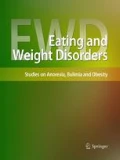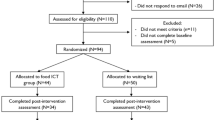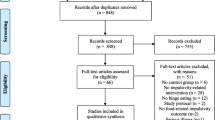Abstract
Purpose
Impulsivity might contribute to the development and maintenance of obesity and eating disorders. Patients suffering from binge eating disorder (BED) show an impulsive eating pattern characterized by regular binge eating episodes. Novel behavioral interventions increasing inhibitory control could improve eating behavior in BED. We piloted a novel food-specific inhibition training in individuals with BED.
Methods
N = 22 BED patients according to SCID-I were randomly assigned to three sessions of a training or control condition. In both conditions, pictures of high-caloric food items were presented in peripheral vision on a computer screen while assessing gaze behavior. The training group had to suppress the urge to turn their gaze towards these pictures (i.e., to perform antisaccades). The control group was allowed to freely explore the pictures. We assessed self-reported food craving, food addiction, and wanting/liking of food pictures pre- and post-intervention.
Results
Twenty participants completed the study. The training proved to be feasible and acceptable. Patients of the training group significantly improved inhibitory control towards high-caloric food stimuli. Both groups reported a significantly lower number of binge eating episodes in the last four weeks after termination of the study. No changes were found in food craving, food addiction, liking, and wanting ratings.
Conclusions
A food-specific inhibition training could be a useful element in the treatment of BED and other eating disorders; however, larger efficacy studies in patient samples are needed to investigate the efficacy of this and similar training approaches.

Similar content being viewed by others
References
Smith DG, Robbins TW (2013) The neurobiological underpinnings of obesity and binge eating: a rationale for adopting the food addiction model. Biol Psychiatry 73:804–810
Gerlach G, Herpertz S, Loeber S (2015) Personality traits and obesity: a systematic review. Obes Rev 16:32–63
Schag K, Schönleber J, Teufel M, Zipfel S, Giel KE (2013) Food-related impulsivity in obesity and binge eating disorder—a systematic review. Obes Rev 14: 477–495.
Sharma L, Markon KE, Clark LA (2014) Toward a theory of distinct types of “impulsive” behaviors: a meta-analysis of self-report and behavioral measures. Psychol Bull 140:374–408
Dawe S, Loxton NJ (2004) The role of impulsivity in the development of substance use and eating disorders. Neurosci Biobehav Rev 28:343–351
American Psychiatric Association (Ed.) (2013) Diagnostic and statistical manual of mental disorders: DSM-5. American Psychiatric Association, Washington, DC
Treasure J, Cardi V, Leppanen J, Turton R (2015) New treatment approaches for severe and enduring eating disorders. Physiol Behav 152:456–465
Turton R, Bruidegom K, Cardi V, Hirsch CR, Treasure J (2016) Novel methods to help develop healthier eating habits for eating and weight disorders: a systematic review and meta-analysis. Neurosci Biobehav Rev 61:132–155
Jones A, Di Lemma LC, Robinson E, Christiansen P, Nolan S, Tudur-Smith C, Field M (2016) Inhibitory control training for appetitive behaviour change: a meta-analytic investigation of mechanisms of action and moderators of effectiveness. Appetite 97:16–28
Antoniades C, Ettinger U, Gaymard B, Gilchrist I, Kristjansson A, Kennard C, John Leigh R, Noorani I, Pouget P, Smyrnis N, Tarnowski A, Zee DS, Carpenter RH (2013) An internationally standardised antisaccade protocol. Vision Res 84:1–5
Giel KE, Schag K, Plewnia C, Zipfel S (2013) Antisaccadic training to improve impulsivity in binge eating disorder. Eur Eat Disord Rev 21:488–492
Schag K, Teufel M, Junne F, Preissl H, Hautzinger M, Zipfel S, Giel KE (2013) Impulsivity in binge eating disorder: food cues elicit increased reward responses and disinhibition. PLoS ONE 8:e76542
Houben K, Jansen A (2015) Chocolate equals stop. Chocolate-specific inhibition training reduces chocolate intake and go associations with chocolate. Appetite 87:318–323
Munoz DP, Everling S (2004) Look away: the anti-saccade task and the voluntary control of eye movement. Nat Rev Neurosci 5:218–228
Hilbert A, Tuschen-Caffier B (2006) Eating disorder examination: deutschsprachige Übersetzung. Verlag für Psychotherapie, Münster
Hilbert A, de Zwaan M, Braehler E (2012) How frequent are eating disturbances in the population? Norms of the eating disorder examination-questionnaire. PLoS ONE 7:e29125
Meule A, Lutz A, Vogele C, Kubler A (2012) Food cravings discriminate differentially between successful and unsuccessful dieters and non-dieters. Validation of the food cravings questionnaires in German. Appetite 58:88–97
Meule A, Vögele C, Kübler A (2012) Deutsche Übersetzung und Validierung der Yale Food Addiction Scale. Diagnostica 58:115–126
Giel KE, Leehr EJ, Becker S, Herzog W, Junne F, Schmidt U, Zipfel S (2015) Relapse prevention via videoconference for anorexia nervosa—findings from the RESTART pilot study. Psychother Psychosom 84:381–383
Berridge KC (2009) ‘Liking’ and ‘wanting’ food rewards: brain substrates and roles in eating disorders. Physiol Behav 97:537–550
Veling H, van Koningsbruggen GM, Aarts H, Stroebe W (2014) Targeting impulsive processes of eating behavior via the internet. Effects on body weight. Appetite 78:102–109
Houben K, Jansen A (2001) Training inhibitory control. A recipe for resisting sweet temptations. Appetite 56:345–349
Lawrence NS, Verbruggen F, Morrison S, Adams RC, Chambers CD (2015) Stopping to food can reduce intake. Effects of stimulus-specificity and individual differences in dietary restraint. Appetite 85:91–103
Leehr EJ, Krohmer K, Schag K, Dresler T, Zipfel S, Giel KE (2015) Emotion regulation model in binge eating disorder and obesity—a systematic review. Neurosci Biobehav Rev 49:125–134
Litwin R, Goldbacher EM, Cardaciotto L, Gambrel LE (2016) Negative emotions and emotional eating: the mediating role of experiential avoidance. Eat Weight Disord. doi:10.1007/s40519-016-0301-9
Schag K, Leehr EJ, Martus P, Bethge W, Becker S, Zipfel S, Giel KE (2015) Impulsivity-focused group intervention to reduce binge eating episodes in patients with binge eating disorder: study protocol of the randomised controlled IMPULS trial. BMJ Open 5:e009445
Acknowledgements
We thank all patients for their participation in the present study.
Author information
Authors and Affiliations
Corresponding author
Ethics declarations
Conflict of interest
The authors declare that they have no conflict of interest.
Ethical approval
All procedures performed in studies involving human participants were in accordance with the ethical standards of the institutional and/or national research committee and with the 1964 Helsinki declaration and its later amendments or comparable ethical standards.
Informed consent
Informed consent was obtained from all individual participants included in the study.
Rights and permissions
About this article
Cite this article
Giel, K.E., Speer, E., Schag, K. et al. Effects of a food-specific inhibition training in individuals with binge eating disorder—findings from a randomized controlled proof-of-concept study. Eat Weight Disord 22, 345–351 (2017). https://doi.org/10.1007/s40519-017-0371-3
Received:
Accepted:
Published:
Issue Date:
DOI: https://doi.org/10.1007/s40519-017-0371-3




